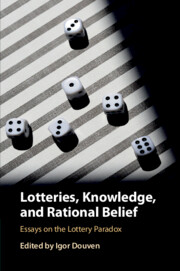Book contents
- Lotteries, Knowledge, and Rational Belief
- Lotteries, Knowledge, and Rational Belief
- Copyright page
- Contents
- Contributors
- Introduction
- Chapter 1 Rational Belief and Statistical Evidence
- Chapter 2 Knowledge Attributions and Lottery Cases
- Chapter 3 The Psychological Dimension of the Lottery Paradox
- Chapter 4 Three Puzzles about Lotteries
- Chapter 5 Four Arguments for Denying that Lottery Beliefs Are Justified
- Chapter 6 Rethinking the Lottery Paradox
- Chapter 7 Rational Belief in Lottery- and Preface-Situations
- Chapter 8 Stability and the Lottery Paradox
- Chapter 9 The Lottery, the Preface, and Epistemic Rule Consequentialism
- Chapter 10 Beliefs, Probabilities, and Their Coherent Correspondence
- Chapter 11 The Relation between Degrees of Belief and Binary Beliefs
- Bibliography
- Index
Chapter 1 - Rational Belief and Statistical Evidence
Blame, Bias, and the Law
Published online by Cambridge University Press: 29 January 2021
- Lotteries, Knowledge, and Rational Belief
- Lotteries, Knowledge, and Rational Belief
- Copyright page
- Contents
- Contributors
- Introduction
- Chapter 1 Rational Belief and Statistical Evidence
- Chapter 2 Knowledge Attributions and Lottery Cases
- Chapter 3 The Psychological Dimension of the Lottery Paradox
- Chapter 4 Three Puzzles about Lotteries
- Chapter 5 Four Arguments for Denying that Lottery Beliefs Are Justified
- Chapter 6 Rethinking the Lottery Paradox
- Chapter 7 Rational Belief in Lottery- and Preface-Situations
- Chapter 8 Stability and the Lottery Paradox
- Chapter 9 The Lottery, the Preface, and Epistemic Rule Consequentialism
- Chapter 10 Beliefs, Probabilities, and Their Coherent Correspondence
- Chapter 11 The Relation between Degrees of Belief and Binary Beliefs
- Bibliography
- Index
Summary
It is rational to believe all sorts of things, even things about which we are not absolutely certain, and about which we admit that there is a chance that we are wrong. And we know that it is possible to have excellent evidence for propositions that are false. For example, I believe – rationally – that I will be in Munich next month, based on my intention to be there, having taken all requisite steps to enact my plan, such as making a flight reservation, and yet I admit that there is a small chance that I will not in fact be in Munich. A small percentage of transatlantic flights are cancelled, there is a small chance of a natural disaster such as a volcano eruption that grounds all flights across Europe, and so on. Yet when it comes to some propositions, we can have apparently very strong evidence that makes their truth extremely likely – even more likely than that I will be in Munich next month – without its being rational to believe them. For example, there is a good argument that it is not rational for me to believe that my single ticket in a million-ticket lottery will lose, based on the evidence that 999,999 tickets will lose.1 Is this correct? If so, how can we explain it?
- Type
- Chapter
- Information
- Lotteries, Knowledge, and Rational BeliefEssays on the Lottery Paradox, pp. 6 - 27Publisher: Cambridge University PressPrint publication year: 2021
- 3
- Cited by

